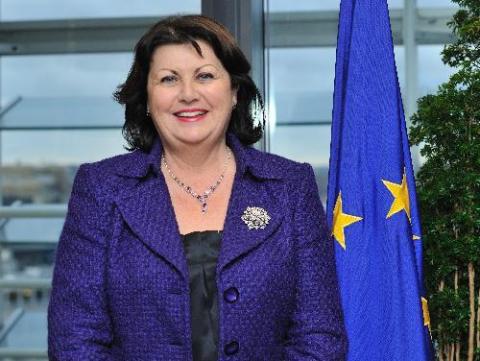Ministers have a nerve telling others to cough up

Máire Geoghegan-Quinn was asked to ‘set an example’ by people costing the State €500,000 a year. By Vincent Browne.
Mary Hanafin was on television the other night telling Máire Geoghegan-Quinn she should forgo her ministerial pension while she is a European commissioner (this was before Máire had her epiphany). Mary Hanafin and the other Ministers, who said as much, had some nerve. Few more so than Mary Hanafin herself.
Mary Hanafin has been a minister for 10 years and a Cabinet Minister for six years. She has a good chance of losing her seat in the next general election. Assuming she is no longer in the Dáil in 2012, Mary Hanafin will get a pension of about €100,000 and the actuarial cost of this is about €4m. And, on top of the €100,000 pension she has an entitlement to return to her role as secondary school teacher, a role she left in 1997 but one from which she has taken leave of absence – 15 years’ leave of absence by 2012.
I asked her office about this and got the following reply: “Minister Hanafin availed of the Special Oireachtas leave for teachers in 1997. Under the scheme the teaching post is held open for the duration of election to the Oireachtas. This is an arrangement which has been in place for many years. The Minister receives no remuneration, nor has accrued any additional pension entitlements in that period. Any replacement teacher gets full salary, increments and pension rights and after a fixed period of time, generally four years, may be able to obtain a Contract of Fixed Duration”. Note the “may” in the last sentence of this communication.
But if Mary Hanafin returns to teaching, won’t the State have to pay off the additional teacher or fire someone? Great isn’t it? And, by the way, ever wonder why so many of our TDs are teachers?
In the meantime Mary Hanafin costs the State (ie everyone else) close to €500,000 a year. She gets a salary of about €180,000. Expenses come to about €100,000 and the State car plus two full-time Garda drivers cost €200,000. Plus the €4m ministerial pension that awaits her in 2012.
On the TV the other night she was talking about “leadership”, “setting an example”!
How is it that Ministers whose total package per year is close to half a million have the nerve to tell the rest of us why we have to cut back? Why social welfare recipients are to get less and the lowest paid in the public service have to suffer pay cuts?
These are the same Ministers who leave the wealth and the income of the elite largely untouched and who think it is okay to ask the poorer sections of society to carry the burden.
According to the Rich List published by the Sunday Times three days ago, the top 250 richest people in Ireland have wealth amounting to €40 billion, which works out at about €160m each. That is after the discounts in wealth caused by the recession are taken into account. Most of the developers and Seán Quinn have vanished from the rich list, this is just the rich that are left.
According to the Sunday Independent 10 days ago, an Irish company, Tullow Oil, which is engaged in extracting oil from Ghana and Uganda, paid its 10 senior executives a total of €43m last year. Aryzta, a food and agri-business group, paid its chief executive, Owen Killian, €10.2m last year. Patrick Kennedy, chief executive of Paddy Power, the bookmakers, was paid €4.69m in 2009. His second in command at the bookmakers enterprise, Breon Corcoran, got €3.52m.
Denis Casey, formerly of Irish Life and Pensions, got €4.574m, which included a departure bonus of €2.93m. The chief executive of CRH, Myles Lee, got €4.08m. Another CRH executive, Mark Towe, got a €3.59m deal. Stan McCarthy of the Kerry Group got €1.525m. Gary McGann of Smurfit Kappa got €2.23m. Tommy Breen of DCC got €2.11m. Kelly Martin of Elan got €1.23m. Kingspan’s Gene Murtagh got close to €2m and another Kingspan executive, Dermot Mulvihill, got €2.6m.
How is it that so many people are paid such vast fortunes, while millions are paid pittance by comparison? If we all had started out on a desert island and were asked to decide on how the wealth, accumulated by our collective efforts, should be distributed, is it likely we would have agreed to a dispersal of income and wealth on such a vast scale? If anyone suggested that bookies, oil magnates extracting resources from some of the poorest countries in the world and concrete manufacturers would be paid at multiples of thousands what those keeping the peace, caring for children and old people, looking after the sick and educating people were paid, wouldn’t we think they were bonkers?
And how is it that when a crisis occurs in the State’s finances, we take money from some of the poorest and least paid, instead of getting those with such vast wealth and such huge incomes to pay their fair share?
And why, when someone talks of such a reasonable resolution of our crisis, are they branded a communist, determined to rob people of their liberties, enslave them in gulags, crush all religion and freedom of speech and close the pubs early? Odd, isn’t it?
